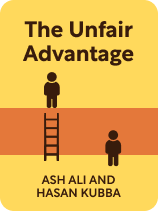

This article is an excerpt from the Shortform book guide to "The Unfair Advantage" by Ash Ali and Hasan Kubba. Shortform has the world's best summaries and analyses of books you should be reading.
Like this article? Sign up for a free trial here .
Do you have a good reputation in your field? Are you making the most of the trust you’ve earned from others?
In The Unfair Advantage, entrepreneurs Ash Ali and Hasan Kubba explain how your reputation can give you a leg up over the competition. Other businesses and professionals do what you do, but they don’t have the same status and connections you have. You can leverage your reputation and relationships to find success.
Read more to learn why reputation is important and how to use it to your advantage.
Reputation and Social Connections
Reputation and social connections interact to provide an unfair advantage. Reputation (or status) refers to the value others attribute to you and your expertise. As Ali and Kubba explain, when others hold you in high regard, they’ll be more likely to trust you, which is essential as you work to gain traction in your startup.
(Shortform note: Some business leaders say that your reputation and perceived status are the most important factors in your business success, affirming Ali and Kubba’s contention about why reputation is important. When people trust you, they’re more likely to repeat business with you and forgive mistakes. Therefore, it’s critical to proactively build and protect your reputation, especially online. According to research, 91% of consumers trust online reviews as much as personal recommendations, and 65% of internet users believe an online search is the most trusted source of information about people and companies.)
Your social connections encompass both personal and professional relationships. The people you know and interact with routinely can influence your level of motivation and your access to opportunities. For example, if you’re surrounded by people who are business-oriented and driven, you can benefit from their knowledge and draw inspiration from their success. Also, the wider your network, the greater chance you’ll have of meeting or being introduced to potential funders and business partners.
(Shortform note: Decades of research link networking to entrepreneurial success, as strong networks increase your access to opportunities, resources, and information. Entrepreneurs have on average twice as many online network connections as non-entrepreneurs. Although the size of someone’s network doesn’t necessarily correlate with startup success, research shows that people who actively and strategically use their networks achieve more success, validating Ali and Kubba’s advice. One tip that experts recommend to improve the strength of your network is to leverage the business networking site LinkedIn. Update your profile, publicize your milestones, and secure endorsements from investors, mentors, and customers.)
How to Know If Reputation and Social Connections Are Your Unfair Advantage
As for how to determine if reputation and social connections give you an unfair advantage, Ali and Kubba say you likely already know. If you’ve experienced significant recognition, support, and privileges throughout your life, the answer is probably yes.
(Shortform note: People with status and social connections may not be as aware of their advantages as Ali and Kubba assume them to be. Research shows that those in a higher social class generally believe that they’re more competent and skilled than those in lower classes, even environments where this isn’t the case. Thus, they may be likely to attribute their success to their own merits instead of their reputation and social connections.)
How to Improve Your Reputation and Social Connections
If you feel that your reputation and social network are weak and want to improve, here are some steps you can take:
- Be generous to others, and they’ll be generous to you in return. Even the smallest act of kindness may help you build a relationship with someone who can help you in the future.
- Attend business development or networking groups.
| Be Strategic to Boost Your Reputation and Social Connections Ali and Kubba offer a couple of strategies to improve your reputation and social connections—let’s examine each of them a little more closely. In The Go-Giver, Bob Burg and John David Mann note that the only way to build a network through generosity is to give without keeping score. They state that it’s common for business acquaintances to keep track of how many favors they owe to one another, but doing so reduces generosity on both sides. Don’t look for win-win situations—generously allow others to win entirely, and they’ll be loyal to you for life. The authors also recommend attending business development or networking groups, but how do you know if a networking group is worthwhile? Experts recommend you look for some key features. One attribute to look for is a consistent structure—regularly scheduled meetings, a clear agenda, and definitive start and end times. This provides members a reliable way to build relationships over time. Also, look for a group that carefully selects members rather than just allowing anyone to participate. The best groups place a high value on members’ commitment, openness, and the quality of their relationships in the community. |

———End of Preview———
Like what you just read? Read the rest of the world's best book summary and analysis of Ash Ali and Hasan Kubba's "The Unfair Advantage" at Shortform .
Here's what you'll find in our full The Unfair Advantage summary :
- The guidebook you need if you're planning to start a business
- How to find and use your unfair advantages (everybody has some)
- The steps you must take to achieve startup success






